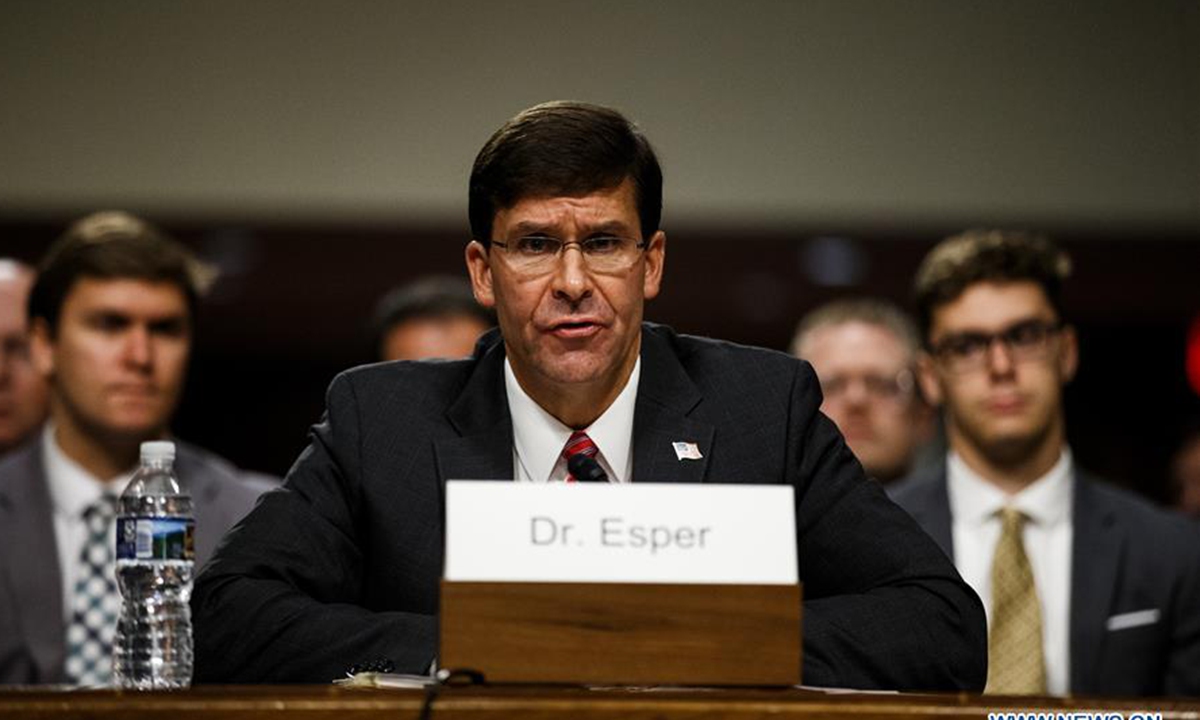Esper hints no hot war, but puts allies in quandary
By Su Xiaohui Source: Global Times Published: 2020/8/26 20:53:40

Mark Esper Photo: Xinhua
Does the US really ever want a hot war with China? Will words from the chief of the Pentagon give any hints?
On Monday, US Defense Secretary Mark Esper published an article in the Wall Street Journal titled, "The Pentagon is Prepared for China". Esper stressed threats from China's People's Liberation Army and called for US allies and partners to stand against China's "bullying" and defend the so-called free and open international system.
It is worth noting that the article was published right as the US military ratchets up provocations against China in the East China Sea, the South China Sea and the Taiwan Straits - with risks of a head-on clash edging ever closer to a cliff.
In this light, Esper's words are not surprising. He has always been a hardliner toward China. He is not one who can say anything good about China. Nor can people expect him to publicly go against the general anti-China trend in the US. In the article, he seems to be crafting a military path to compete with China.
Nonetheless, Esper did not explicitly say that he wants to win this competition with China through war. The Pentagon is not in favor of a hot war with China - although it keeps provoking China in the high seas. Esper noted that the US must "have a force that is able to compete, deter and win across all domains including air, land, sea, space and cyberspace." This sounds like an arms race, but has been the US strategy for a long time and is routine behavior for the major power competition. He probably was asking for more resources from the US government.
Esper's views are actually a continuation of his prior posture on August 6 when he spoke over the phone with China's Defense Minister Wei Fenghe. The talk itself showed that the US needs China. Esper, using diplomatic etiquette, said that amid tensions between the two countries, both militaries should maintain dialogue and consultation to manage crises, avoid misjudgment, and reduce risks. However, he used harsh words in the WSJ article, largely catering to domestic audiences. Still, the core content is the same: the US will continue to grab for military advantages over China and militarily suppress China and the US is clear about the risks of a large-scale war. Esper's aim of visiting China by the end of this year seeks ways for the two to manage differences, and simultaneously serve US interests. Actually, amid the overall US suppression of China, the militaries from both countries are the ones who are maintaining good communications.
China hopes the US knows that conflicts are normal, but it is important to manage them. The US should not vent its anti-China sentiment aimlessly while being unable to bear the consequences of such animosity. Before the presidential elections, both sides should be aware of the risks of further confrontation, particularly in the military arena.
From Esper's words, China can get another message - that the US is paying great attention to China and the US feels a deep sense of crisis only because China has done so well. In his article, Esper was trying to woo "like-minded" partners. This demonstrates that the US has not been successful in doing so in recent years. With the "carrots" of ideology and rules-based order, the US is forcing its allies to pick a side. This bullying shows US anxiety, and the true intention is to use the "stick" of military deployment to get what it wants.
On August 14, US Special Presidential Envoy for Arms Control Marshall Billingslea told Japan's Nikkei that the US is in talks with its Asian allies to deploy midrange missiles to counter "the immediate threat" of China's nuclear arsenal. This week, Esper will head to Hawaii, Palau and Guam. In Guam, he is set to meet his Japanese counterpart. He will likely put pressure on Japan and talk about the deployment of midrange missiles.
This will put Japan in a difficult position because it needs China economically. But meanwhile, Japan has to pay heed to its security alliance with the US.
After the US withdrew from the 1987 INF Treaty in August 2019, Fu Cong, director general of the Department of Arms Control and Disarmament of China's Ministry of Foreign Affairs, singled out Japan, South Korea and Australia and urged them to exercise prudence and not to allow the US to deploy intermediate-range missiles on their territories. With South Korea's deployment of THAAD as lessons, Japan will watch China's stance. But the US will definitely make its allies, like Japan, caught in a dilemma.
The author is deputy director of the Department for International and Strategic Studies, China Institute of International Studies. opinion@globaltimes.com.cn
Posted in: VIEWPOINT,CHINA-US